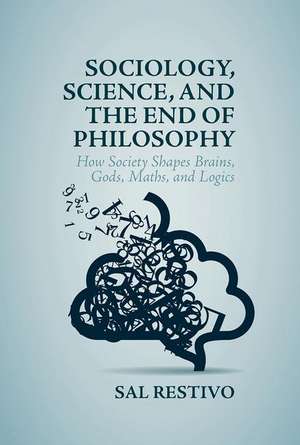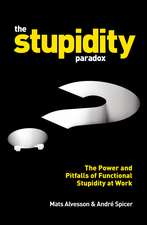Sociology, Science, and the End of Philosophy: How Society Shapes Brains, Gods, Maths, and Logics
Autor Sal Restivoen Limba Engleză Hardback – 26 iul 2017
| Toate formatele și edițiile | Preț | Express |
|---|---|---|
| Paperback (1) | 635.80 lei 38-44 zile | |
| Palgrave Macmillan UK – 29 iul 2018 | 635.80 lei 38-44 zile | |
| Hardback (1) | 703.71 lei 6-8 săpt. | |
| Palgrave Macmillan UK – 26 iul 2017 | 703.71 lei 6-8 săpt. |
Preț: 703.71 lei
Preț vechi: 827.89 lei
-15% Nou
Puncte Express: 1056
Preț estimativ în valută:
134.66€ • 140.95$ • 112.08£
134.66€ • 140.95$ • 112.08£
Carte tipărită la comandă
Livrare economică 01-15 aprilie
Preluare comenzi: 021 569.72.76
Specificații
ISBN-13: 9781349951598
ISBN-10: 1349951595
Pagini: 335
Ilustrații: XIII, 370 p. 1 illus.
Dimensiuni: 148 x 210 mm
Greutate: 0.61 kg
Ediția:1st ed. 2017
Editura: Palgrave Macmillan UK
Colecția Palgrave Macmillan
Locul publicării:London, United Kingdom
ISBN-10: 1349951595
Pagini: 335
Ilustrații: XIII, 370 p. 1 illus.
Dimensiuni: 148 x 210 mm
Greutate: 0.61 kg
Ediția:1st ed. 2017
Editura: Palgrave Macmillan UK
Colecția Palgrave Macmillan
Locul publicării:London, United Kingdom
Cuprins
Prologue, Part 1. Requiem for Plato and the Gods.- Prologue, Part 2. The Postmodern Context.- Chapter 1. The Science of Society.- Chapter 2. What about the Gene and What about the Brain?.- Chapter 3. The Social Lives of Minds and Brains.- Chapter 4. Thinking Machines.- Chapter 5. God and Society.- Chapter 6. The Social Construction of Mathematics.- Chapter 7. What Can a Sociologist Say about Logic?.- Chapter 8. Conclusion.- Appendix 1. Moments in the History of the Science of Society.- Appendix 2. Modelling the Social Brain.
Notă biografică
Sal Restivo is Adjunct Professor of Technology, Culture and Society at NYU Tandon School of Engineering, USA and former Professor of Sociology, Science, and Information Technology at Rensselaer Polytechnic Institute, USA.
Textul de pe ultima copertă
This book offers a unique analysis of how ideas about science and technology in the public and scientific imaginations (in particular about maths, logic, the gene, the brain, god, and robots) perpetuate the false reality that values and politics are separate from scientific knowledge and its applications. These ideas are reinforced by cultural myths about free will and individualism. Restivo makes a compelling case for a synchronistic approach in the study of these notoriously 'hard' cases, arguing that their significance reaches far beyond the realms of science and technology, and that their sociological and political ramifications are of paramount importance in our global society. This innovative work deals with perennial problems in the social sciences, philosophy, and the history of science and religion, and will be of special interest to professionals in these fields, as well as scholars of science and technology studies.<
Caracteristici
Offers a genealogical analysis of scientific and mathematical thinking Assesses the social ramifications which occur when we consider epistemology Draws on a wide range of disciplines: philosophy, technology, history of science, psychology














